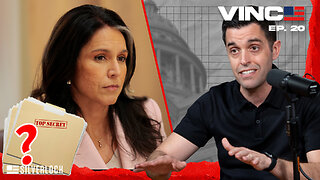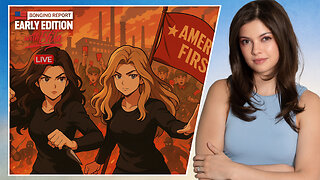Premium Only Content

Bobby Hull - SC
Bobby Hull was instrumental in two hockey leagues in two decades. The Golden Jet of the Chicago Blackhawks won seven goal-scoring titles, three overall scoring championships and two Most Valuable Player awards in the National Hockey League in the sixties. Then the flamboyant left wing's signing with the Winnipeg Jets gave instant credibility to a new league, the World Hockey Association, in the seventies.
One of the fastest skaters in the game, the 5-foot-10, 193-pound Hull had a remarkable physique with his muscular torso and powerful legs. His slap shot was a blur, often traveling more than 100 mph as he terrorized goaltenders with its speed and accuracy. No wonder he was one Hull of a scorer.
Before Hull, only twice had players scored 50 goals in a season (Rocket Richard in 1944-45 and Boom Boom Geoffrion in 1960-61). The next four names in the NHL's chronological list of 50-goal scorers in its Official Guide & Record Book are Bobby Hull, Bobby Hull, Bobby Hull and Bobby Hull. (There also was a fifth 50-goal season for Hull in 1971-72.) Not until the seventies, after expansion and longer schedules, did scoring 50 goals become something other than a rarity.
Other notable achievements for Hull were his being the second player to score 100 points in a season and being voted the league's first-team all-star left wing 10 times and second-team twice in his last 13 seasons with Chicago. His 610 goals were the record for NHL left wings until Luc Robitaille passed him in 2002.
The fourth of 11 children, Hull was born on Jan. 3, 1939 in Pointe Anne, Ontario, a small cement-factory town 120 miles northeast of Toronto. He was a toddler when his sisters Maxine and Laura introduced him to skating at an outdoor rink near their home.
After progressing through Canada's junior hockey system, he was called up by Chicago at 18 from the St. Catherines Tee Pees in 1957. It wasn't long before Chicago fans, who had been turned off by four straight last-place finishes in a six-team league, came flocking back to see the spectacular left wing.
Hull scored his first goal on Oct. 22, 1957, and finished the season with 13. He notched 18 in his second year, when Chicago reached the playoffs after a five-year drought. Then came his breakout season.
A greatly improved Hull was united with Murray Balfour and rookie Bill Hay to form the "Million Dollar Line," one of the best units in the NHL for the next four seasons. Hull led the league in scoring with 81 points and his 39 goals tied the Bruins' Bronco Horvath for the goal-scoring title. Before a hostile Boston crowd, Hull scored No. 39 on the season's last day, enabling him to beat Horvath by a point for the scoring title.
Hull's knee bothered him during the 1960-61 season and his production dropped to 31 goals and 56 points (13th in the league in scoring). But in the opening game of the Stanley Cup finals, Hull scored twice as Chicago defeated Detroit 3-2 and it went on to win the series in six games for its first Cup in 23 years. This would be Hull's only Cup in his 16 NHL seasons. (Chicago is 0-for-the last 41 years.)
After a slow start the next season, Hull came on strong. He scored 35 goals in his last 31 games to join the 50-goal club, with the last goal coming in the season finale. Hull and the Rangers' Andy Bathgate tied for the most points with 84, but Hull was awarded his second Art Ross Trophy as scoring champion because he had more goals (50 to 28).
Hull scored 113 goals over the next three seasons. With 87 points in 1963-64, he lost the scoring title by two points to teammate Stan Mikita. The next season, although his point production fell to 71 and Chicago finished third, Hull was voted the Hart Trophy as MVP.
He retained the Hart Trophy the next year as he became the first player to score more than 50 goals in a season. When he deposited No. 51 on March 12, 1966, beating Rangers goalie Cesare Maniago, the crowd of 22,000 in Chicago gave him a seven-minute standing ovation. He finished with 54 goals (in 65 games) and with his 97 points won his third scoring title, by a whopping 19 points.
Hull scored a league-leading 52 goals and had 80 points (No. 2 in scoring behind Mikita) in 1966-67. The NHL expanded the next season, doubling in size to 12 teams, and Hull again led the league, with 44 goals.
In 1968-69, the Golden Jet -- he got the nickname because of his speed and his blonde hair -- exploded for career-bests of 58 goals and 107 points, notching his 100th point 18 days after Boston's Phil Esposito became the first player to crack the century mark. Hull scored 38 and 50 goals the next two years before making the big jump.
When Winnipeg initially made him a Godfather offer -- reportedly a 10-year contract for $2.75 million, including a $1 million signing bonus -- Hull didn't take it seriously. "I thought it was a joke," he said. "I pretended to go along with it, just to scare Chicago. Then my agent said, 'Bobby, these guys are serious.' "
For years Hull had feuded over contracts with the Wirtz family, who owned the Chicago franchise. When they didn't match Winnipeg's offer, Hull signed with the Jets in the summer of '72. "If I told you that the big contract had nothing to do with my signing," he said, "I'd be lying."
Hull's signing opened the way for bigger contracts for all hockey players, as NHL owners were forced to pay larger salaries to prevent more players from jumping.
After sitting out a month because of litigation, Hull scored 51 goals in 63 games and was voted MVP in his first year in the WHA. The best of his seven seasons in the upstart league was 1974-75 when he scored 77 goals and earned his second WHA MVP award.
He was chosen for the all-league first-team three times (1973, 1974 and 1975) and second-team twice (1976 and 1978).
He staged a one-man, one-game strike in protest of violence in hockey during the 1977-78 season. He played only four games the next season before retiring, but came back for one more year after the NHL accepted four WHA teams in 1979. Beset by injuries, he scored just six goals in 27 games for Winnipeg and Hartford, where he was a teammate of Gordie Howe.
Finishing his NHL career with 1,170 points (560 assists to go with his 610 goals) in 1,063 games, Hull was inducted into the Hockey Hall of Fame in 1983.
Hockey was in the Hull blood. Bobby played with younger brother Dennis in Chicago and he is part of the only father-son combination to win the Hart Trophy; Brett Hull won the MVP award in 1991 when he scored 86 goals.
Hull's life away from the ice did not always have the same high that his playing gave him. His first marriage ended while he was still a teenager. His second marriage -- to figure skater Joanne McKay, whom he wed in 1960 -- was filled with charges of mental and physical abuse. In an incident in Hawaii in 1966, Joanne said her husband held her over the balcony after hitting her in the head with her shoe.
After several more abusive incidents, she filed for divorce in 1970. However, she agreed to a reconciliation. In 1978, Hull threatened her with a loaded shotgun. Two years later they were divorced, a development which estranged Hull from his five children for several years.
He married his third wife, Deborah, in 1984. Two years later, Hull, who appeared to have been drinking, was charged with assault and battery against her although she later dropped the complaint. However, Hull pleaded guilty to taking a swing at one of the arresting officers. He was fined $150 and placed on six months court supervision.
In August 1998, Hull was vilified after telling a reporter for the Moscow Times that the black population in America was growing too fast and that "Hitler had some good ideas. He just went a bit too far." When asked if it would be fair to label him a racist, Hull said, "I don't give a damn. I'm not running for any political office."
-
 LIVE
LIVE
Side Scrollers Podcast
1 hour agoYasuke Movie Coming, BitChute SHUT DOWN in the UK, New Friday Movie & More | Side Scrollers
247 watching -
 LIVE
LIVE
Film Threat
18 hours agoTHE AMATEUR + DROP + WARFARE + LOADS OF REVIEWS! | Film Threat Livecast
115 watching -
 LIVE
LIVE
The Shannon Joy Show
2 hours ago🔥🔥PART 2: Live Exclusive With Judyth Vary Baker. She Assisted In The First Gain Of Function Research To Create A Cancer Kill Shot In 1963 And Has Something To Say About Chronic Disease …🔥🔥
176 watching -
 1:02:52
1:02:52
VINCE
4 hours agoTulsi Just Found The Classified Election Rigging Files | Episode 20 - 04/11/25
258K201 -
 1:27:55
1:27:55
Caleb Hammer
2 hours agoShe’s Hiding $330,000 Debt From Overseas Husband | Financial Audit
15.3K -
 1:00:01
1:00:01
BonginoReport
7 hours agoFighting the Red Dragon: Evita + Natalie Winters - BR Early Edition w/ Evita (Ep.180)
146K76 -
 2:27:12
2:27:12
Matt Kohrs
12 hours agoChina Retaliates, Breaking Inflation News & Payday Friday || The MK Show
43.6K2 -
 2:59:29
2:59:29
Wendy Bell Radio
8 hours agoAll The President's Men
90.2K44 -
 1:00:23
1:00:23
Randi Hipper
3 hours agoFIRST CRYPTO BILL SIGNED INTO LAW! HISTORICAL MOVE EXPLAINED
32.4K6 -
 1:29:08
1:29:08
JULIE GREEN MINISTRIES
6 hours agoLIVE WITH JULIE
186K202